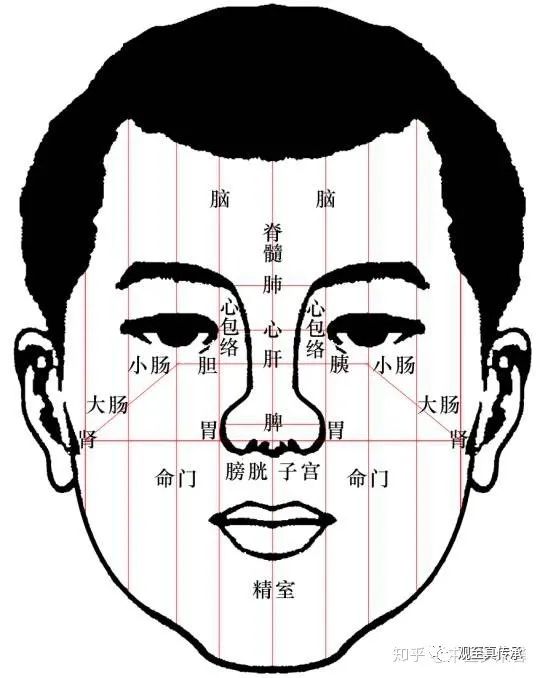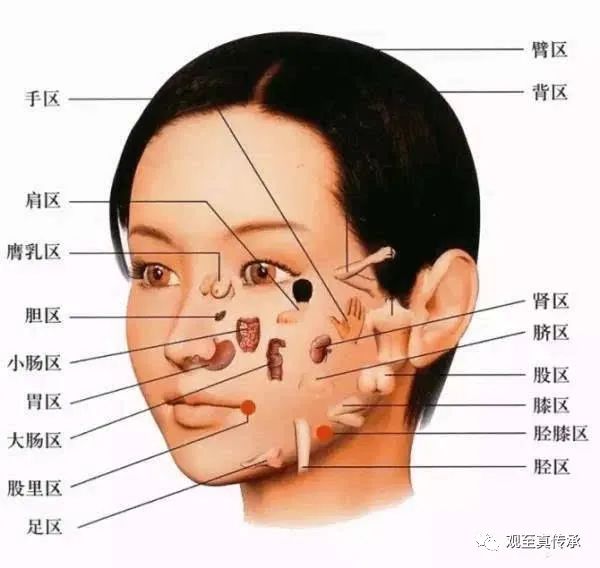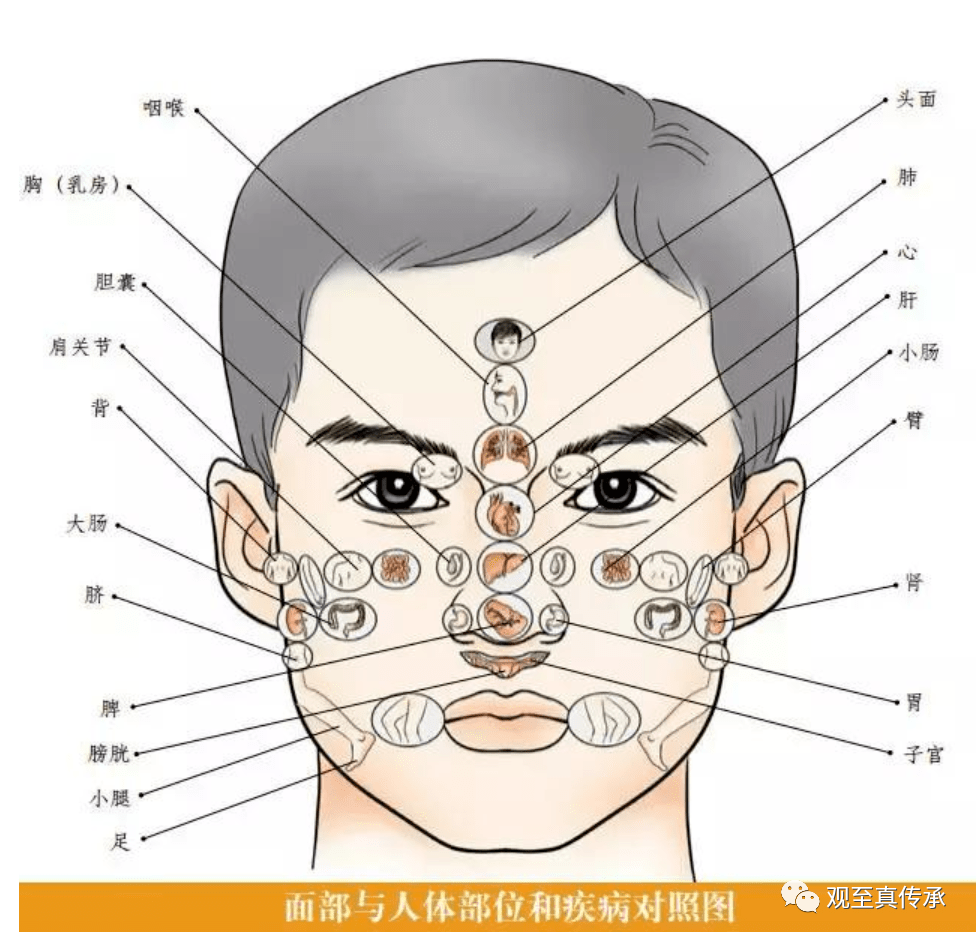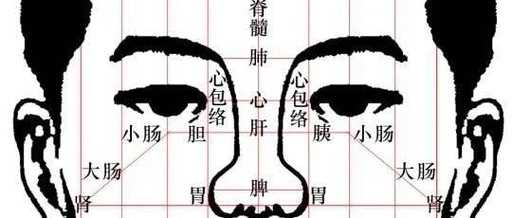In-depth folk remedies and the direction of Traditional Chinese Medicine (TCM) cultural inheritance, please follow the “Guan Zhi Zhen Chuan Cheng” public account! Learn new knowledge every day.
According to TCM, the eyes correspond to the liver, the nose to the lungs, the mouth to the spleen, the ears to the kidneys, and the tongue to the heart. The face acts like a miniature landscape, allowing us to observe the functioning of various organs in the body. Let’s take a look at how to assess health conditions through facial features.

1Wrinkled earlobes and flushed face—indicating heart issues Ancient Chinese medical practitioners discovered through extensive practice that different facial colors reflect various health conditions. Among them, redness is often associated with heart disease. An excessively rosy face indicates an overabundance of blood supply to the heart, making individuals prone to hypertension and heart disease. Those with heart issues should maintain a regular lifestyle, ensure adequate sleep, combine aerobic exercise with strength training, avoid intense workouts, consume less bitter foods, and eat heart-protective foods like asparagus, broccoli, and leafy greens. Regularly massaging the area on the back corresponding to the heart can also promote health. 2Dull nose and yellow complexion—indicating spleen and stomach disharmony A dull yellow complexion may suggest spleen deficiency. TCM believes that the spleen and stomach are the sources of nourishment; if they are weak, there will not be enough nutrients to nourish the face, resulting in a yellowish appearance. Symptoms of spleen and stomach weakness include poor appetite, abdominal bloating after meals, chronic diarrhea, or loose stools. If neglected, it may lead to weight loss or obesity and even trigger jaundice. Skin conditions like acne, melasma, eczema, and itching may also arise from spleen and stomach disharmony. Besides facial color, spleen and stomach function can also be reflected in the nose, lips, and tongue. Pale nasal wings indicate weak stomach qi and reduced digestive function; red, dry nasal wings suggest insufficient stomach fluids; red nasal wings indicate excessive stomach heat; the area around the lips known as the “four whites” should be prominent; if it is not or is particularly dry and yellow, spleen and stomach function is likely poor; dark, wrinkled lips indicate weakened spleen and stomach function; cracked mouth corners suggest spleen and stomach fatigue leading to internal heat. Eating slowly and chewing thoroughly can reduce digestive pressure on the spleen and stomach; a thick tongue coating indicates poor gastrointestinal function or overeating. The first step in caring for the spleen and stomach is to eat regularly and in moderation, chewing food thoroughly. Those with stomach issues should avoid spicy foods and refrain from taking cold showers. Drinking a cup of warm water on an empty stomach in the morning can help cleanse the stomach; mixing honey with water and adding a few drops of sesame oil can nourish the stomach. 3Dark cheeks and dark circles—indicating kidney issues Interestingly, the kidneys correspond to the two cheeks on the face. If the inner sides of the cheeks show gray or dark brown, it indicates weakened kidney detoxification. A gray or dark complexion may suggest chronic kidney disease, often accompanied by lower back pain, urinary irregularities, and reduced sexual function. Common dark circles also belong to a dark complexion, possibly caused by kidney deficiency leading to abnormal water metabolism. Dark circles accompanied by other symptoms may indicate underlying health issues that require attention. Additionally, the pupils are governed by the kidneys; any signs of disease in the pupils should prompt kidney treatment. For example, dull eyelids and a lack of brightness in the pupils may indicate kidney deficiency. The kidneys store essence, and the essence of all organs is stored in the kidneys. Therefore, both men and women should take care of their kidney essence. Key points for kidney health include moderation in sexual activity, avoiding excessive consumption of high-protein foods to reduce kidney burden, and for those with kidney deficiency, eating less salty food and more black foods like black fungus, kelp, and black sesame. Eating two walnuts daily, chewing but not swallowing, can also strengthen the kidneys. A method for kidney nourishment involves gently closing the eyes and licking the upper palate with the tongue tip without applying force, which stimulates saliva secretion that contains salivary factors beneficial for the kidneys. 4Blue complexion and yellow eyes—indicating liver issues When angry, we often use phrases like “veins bulging” or “the face turned green.” A bluish complexion generally indicates a volatile temperament and a risk of liver disease. Liver issues can manifest in the eyes, often appearing as dull or yellowish sclera. Additionally, if the highest point of the nasal bridge is red, it may indicate excessive liver fire, leading to irritability, red eyes, and increased menstrual flow; if it appears bluish-black, it may suggest severe conditions like liver cirrhosis or liver cancer. Liver care can be combined with eye protection; a practical method is to sunbathe the eyes: relax the body, face the sun, close the eyes, allowing the glass and eyelids to filter out intense sunlight while letting warm sunlight penetrate the eyes. Rotate the eyeballs clockwise and counterclockwise for 10 times each, for 15 minutes daily. In terms of diet, those with liver issues should eat less sour food and consider consuming goji berry porridge, black rice porridge, and red date porridge. Spring is crucial for liver health; emotional regulation is essential to avoid depression, which can easily trigger diseases. 5Darkened glabella and red eyes—indicating lung issues Lung health can be assessed by observing the glabella, which should ideally be rosy. If it is particularly red, it indicates lung heat or fire; if pale, it suggests blood or qi deficiency; if blue, it indicates blood stasis. The glabella should never appear black, as this may indicate serious illness. Additionally, the sclera is associated with the lungs; if abnormalities are present, the primary focus should be on treating the liver, but if the sclera alone is problematic, lung treatment is necessary, such as addressing red sclera to clear lung heat. The nose can also reflect lung issues; dry nostrils and hot breath often indicate lung heat, while nasal congestion is typically caused by wind-cold affecting the lungs. To care for the lungs, one must quit smoking and avoid inhaling secondhand smoke. In terms of diet, consuming more white foods, such as raw pears to clear lung heat and reduce excess fire, and cooked foods to nourish lung yin and clear deficiency fire, is beneficial. Raw white radish can clear lung heat and relieve cough, while cooked lotus root can nourish yin and benefit the lungs. Additionally, regular exercise greatly benefits heart and lung health.

Furthermore, careful observation of the facial features can yield unexpected insights: Changes in Facial Features and Health(1) Sudden loss of vision indicates weakened liver function. (2) Diminished sense of smell indicates weakened lung function. (3) Numbness in the lips indicates weakened pancreatic function. When the stomach is compromised, the lips may become dry or even cracked. (4) Difficulty hearing indicates weakened kidney function. Those with sedentary jobs should pay particular attention to this. (5) Diminished taste sensation, accompanied by palpitations, frequent dreams, and insomnia, indicates compromised heart function. When the mouth feels dry and food lacks flavor, it is crucial to monitor for heart disease. Signals of Disease from Facial DiscomfortThe facial features are vital organs closely related to the five internal organs. If the facial features feel uncomfortable, it indicates that the internal organs are gradually losing function, leading to disease.1. Sudden frequent blurriness in vision, dry corners of the eyes, and difficulty seeing indicate early signs of liver function decline. Pressing around the liver may reveal a feeling of fullness. In addition to seeking medical attention, it is essential to maintain eye hygiene and avoid excessive eye strain, as improper eye use can also affect the liver. 2. Persistent ringing in the ears and difficulty hearing signal gradual kidney function decline, often accompanied by symptoms like foot pain, lower back pain, and frequent urination. Those who work excessively should ensure a balance between work and rest, avoid overexertion, and limit alcohol and spicy food intake. 3. Diminished sense of smell, frequent coughing, and sometimes even difficulty breathing indicate gradual lung function decline. Patients should first pay attention to their diet, quit smoking or control their smoking amount, and avoid being around heavy smokers. Eating fresh fruits and vegetables and strengthening physical exercise can help prevent lung complications. 4. Numbness in the lips, reduced appetite, and noticeable weight loss indicate gradual pancreatic function decline, primarily due to dietary imbalances and irregular eating habits. When the pancreas is compromised, it affects the stomach, leading to dry, cracked, and numb lips. In addition to adjusting the diet, it is crucial to avoid raw, cold, and greasy foods. 5. Diminished taste sensation, accompanied by palpitations, frequent dreams, and insomnia, indicates heart function damage. This is often due to overwork; when the mouth feels dry, the tongue coating is thick, and food lacks flavor, it is especially important to be vigilant about potential heart disease. The Relationship Between Facial Features and Internal OrgansThe facial features play a significant role in beauty, directly affecting the appearance of the human face. The functions of the facial features are closely related to the internal organs.鼻: The nose is the respiratory passage and has a ventilatory function, while the lungs govern respiration, hence the nose is referred to as the orifice of the lungs. The nose also has the function of smell; normal ventilation and olfactory function of the nose are related to lung function. When lung qi is sufficient, breathing is smooth, and the sense of smell is acute; when lung qi is insufficient, nasal congestion, runny nose, and poor sense of smell occur. 眼: The eyes are responsible for vision, and the liver opens to the eyes, storing blood; normal liver function allows for clear vision. If liver function is compromised, the eyes may become dry, and vision may decline. TCM also believes that the beauty of the eyes is directly related to the normal functioning of the internal organs. When the essence and qi of the internal organs are abundant, visual function is normal; when the essence and qi are insufficient, it will affect the normal physiological function of the eyes. 口: The mouth is the entrance to the digestive tract, and the spleen opens to the mouth, governing transformation and transportation. When spleen qi is strong, appetite is good, and the mouth appears healthy; if the spleen fails to function properly, it can lead to dampness and heat, resulting in sores or bad breath. 耳: The ears are the auditory organs, and the kidneys store essence, opening to the ears. The auditory function of the ears relies on the nourishment of kidney essence. When kidney essence is abundant, hearing is sharp; when kidney essence is insufficient, hearing declines, leading to a sense of premature aging. 舌: The tongue is an important organ for speech, serving as the external manifestation of the heart. The heart governs blood vessels, and the qi and blood of the heart reach the tongue, maintaining its normal physiological function. When heart blood is abundant and heart qi is strong, the tongue moves freely, and speech is clear; when heart blood is stagnant and heart qi is insufficient, the tongue may become stiff or curled, making speech difficult and unclear. In summary, any discomfort or unattractiveness in any part of the facial features indicates an imbalance in the corresponding internal organs. Therefore, from the holistic perspective of TCM, the normal functioning of the internal organs plays a decisive role in delaying the aging of the face, preventing beauty-related diseases, and maintaining physical health and beauty. To achieve facial beauty, it is essential to care for the internal organs’ vital energy and nourish their yin essence to maintain their normal function. When our body experiences discomfort or unattractiveness, it is a distress signal from the internal organs; neglecting it may lead to regret later.

The Relationship Between Internal Organs and Facial Features The internal organs of the body, such as the heart, stomach, and kidneys, have specific “connections” to different parts of the face. The condition of the internal organs reflects on the face, making diet extremely important for beauty. Increased forehead wrinkles indicate excessive liver burden; therefore, one must quit alcohol and drink at least 3 liters of water daily. If possible, small dietary restrictions, such as skipping a lunch, would be even better. Short horizontal lines on the forehead reflect nervous exhaustion, depression, or anxiety. Lines between the eyebrows may indicate poor sinus health. Dark circles around the eyes and a lack of brightness suggest excessive kidney burden; reduce salt, sugar, and coffee intake, and increase consumption of small red radishes, white radishes, and dandelion. Severe eye bags require kidney nourishment. Dense wrinkles on the upper eyelids indicate heart issues. Crow’s feet at the corners of the eyes may reflect hearing loss or migraines. A gray complexion suggests oxygen deficiency and poor lung function; regular walks in the park and jogging, along with increased intake of green vegetables, protein, minerals, and dietary fiber, are recommended. Diagonal lines on the cheeks may indicate high blood pressure. The nose dislikes excessive sugar; chocolate and sweets can cause red blood vessels to form on the nose, so nuts, fruits, and yogurt can be healthier snack alternatives. However, if the entire nose is red, it indicates excessive heart burden, requiring immediate relaxation, rest, and avoidance of fatty foods. Wrinkles on the nasal bridge may indicate bladder and kidney issues. Swollen upper lips are often caused by stomach spasms, and potatoes can warm the stomach, indirectly benefiting lip beauty. Wrinkles at the corners of the mouth and deep lines on the chin may indicate gastrointestinal issues. Deep neck wrinkles may suggest problems with the cervical spine and metabolic system.
Warm Reminder: The various prescriptions and remedies mentioned in this article are for reference and learning by professional TCM practitioners only and should not be used as prescriptions. Please do not self-medicate blindly; this platform does not bear any responsibility for any consequences arising from this.
Friends who have read this article, if you find the analysis thorough, please click the lower right corner:“Looking at it,” to let more people see this article.

